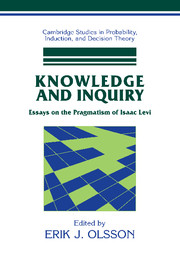Book contents
- Frontmatter
- Contents
- List of Contributors
- Preface
- Introduction: The Pragmatism of Isaac Levi
- 1 Isaac Levi and His Pragmatist Lineage
- 2 Is Pragmatist Truth Irrelevant to Inquiry?
- 3 The Knowledge Business
- 4 Infallibility and Incorrigibility
- 5 Why Inconsistency Is Not Hell: Making Room for Inconsistency in Science
- 6 Levi on Risk
- 7 Vexed Convexity
- 8 Levi's Chances
- 9 Isaac Levi's Potentially Surprising Epistemological Picture
- 10 Isaac Levi on Abduction
- 11 Potential Answers – To What Question?
- 12 Levi and the Lottery
- 13 The Value of Truth and the Value of Information: On Isaac Levi's Epistemology
- 14 Decision-Theoretic Contraction and Sequential Change
- 15 Deciding What You Know
- 16 Levi's Ideals
- 17 The Mind We do Not Change
- 18 Psychoanalysis as Technology
- 19 Levi on Money Pumps and Diachronic Dutch Books
- 20 Levi on the Reality of Dispositions
- 21 Replies
- Index
3 - The Knowledge Business
Published online by Cambridge University Press: 05 March 2010
- Frontmatter
- Contents
- List of Contributors
- Preface
- Introduction: The Pragmatism of Isaac Levi
- 1 Isaac Levi and His Pragmatist Lineage
- 2 Is Pragmatist Truth Irrelevant to Inquiry?
- 3 The Knowledge Business
- 4 Infallibility and Incorrigibility
- 5 Why Inconsistency Is Not Hell: Making Room for Inconsistency in Science
- 6 Levi on Risk
- 7 Vexed Convexity
- 8 Levi's Chances
- 9 Isaac Levi's Potentially Surprising Epistemological Picture
- 10 Isaac Levi on Abduction
- 11 Potential Answers – To What Question?
- 12 Levi and the Lottery
- 13 The Value of Truth and the Value of Information: On Isaac Levi's Epistemology
- 14 Decision-Theoretic Contraction and Sequential Change
- 15 Deciding What You Know
- 16 Levi's Ideals
- 17 The Mind We do Not Change
- 18 Psychoanalysis as Technology
- 19 Levi on Money Pumps and Diachronic Dutch Books
- 20 Levi on the Reality of Dispositions
- 21 Replies
- Index
Summary
Isaac Levi is heir to the great tradition of American pragmatism, and particularly to the strand of it that runs from the writings of Peirce on knowledge and method through the more scientifically oriented works of John Dewey. Levi's approach to epistemology and philosophy of science, begun in Gambling with Truth and further developed in The Enterprise of Knowledge, The Fixation of Belief, and more recent essays and monographs, offers a detailed and rigorous elaboration of a pragmatist picture. In what follows I am less concerned with the details than with the general picture, much of which I find both congenial and important.
Main lines of Levi's view descend from Peirce's belief-doubt model of inquiry. In particular, he continues the following themes:
The rejection of Cartesian thoughts to the effect that doubt is always appropriate; there have to be specific reasons to prompt doubt.
An emphasis on improving our stock of beliefs, rather than grounding them; the task for epistemology and philosophy of science is to identify ways in which inquiry should go better. (There are connections here to ideas of Otto Neurath and W. V. Quine.)
Functionalism about the standards that govern inquiry; the methods we develop should be well adapted to promote our goals; we do not arrive at these methods a priori, but discover them in the course of our investigations. (In the tradition of Dewey, Levi is also sympathetic to the thought that we might inquire into goals as well as into methods.)
Recognition that we all adopt routines for adding new beliefs; the most obvious of these consist in our ways of expanding our corpus of beliefs through perception and in response to the information we receive from others.
- Type
- Chapter
- Information
- Knowledge and InquiryEssays on the Pragmatism of Isaac Levi, pp. 50 - 64Publisher: Cambridge University PressPrint publication year: 2006
- 1
- Cited by

